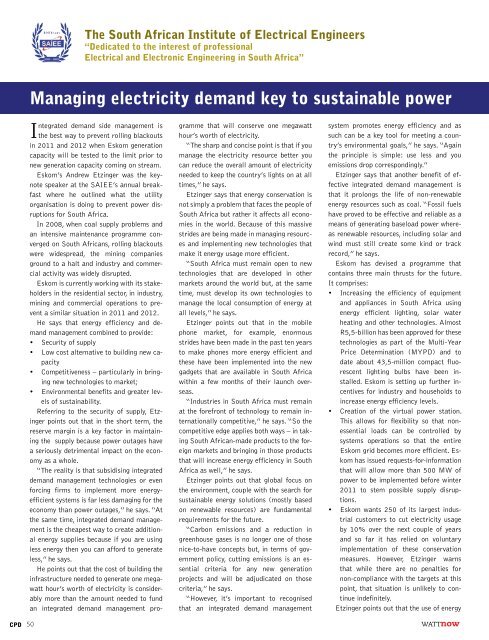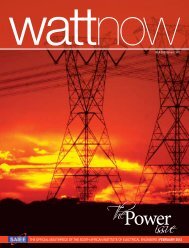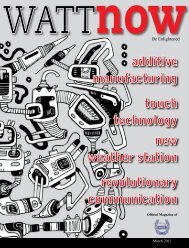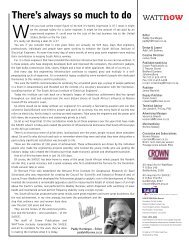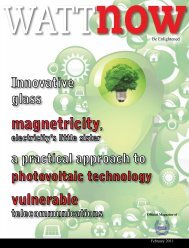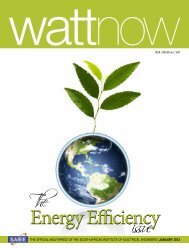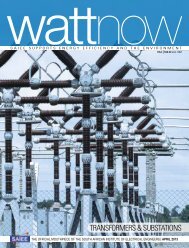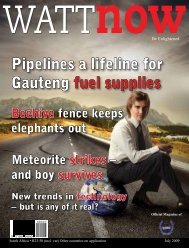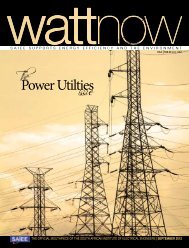download a PDF of the full November 2010 issue - Wattnow
download a PDF of the full November 2010 issue - Wattnow
download a PDF of the full November 2010 issue - Wattnow
You also want an ePaper? Increase the reach of your titles
YUMPU automatically turns print PDFs into web optimized ePapers that Google loves.
The South African Institute <strong>of</strong> Electrical Engineers<br />
“Dedicated to <strong>the</strong> interest <strong>of</strong> pr<strong>of</strong>essional<br />
Electrical and Electronic Engineering in South Africa”<br />
Managing electricity demand key to sustainable power<br />
50 51<br />
Integrated demand side management is<br />
<strong>the</strong> best way to prevent rolling blackouts<br />
in 2011 and 2012 when Eskom generation<br />
capacity will be tested to <strong>the</strong> limit prior to<br />
new generation capacity coming on stream.<br />
Eskom’s Andrew Etzinger was <strong>the</strong> keynote<br />
speaker at <strong>the</strong> SAIEE’s annual breakfast<br />
where he outlined what <strong>the</strong> utility<br />
organisation is doing to prevent power disruptions<br />
for South Africa.<br />
In 2008, when coal supply problems and<br />
an intensive maintenance programme converged<br />
on South Africans, rolling blackouts<br />
were widespread, <strong>the</strong> mining companies<br />
ground to a halt and industry and commercial<br />
activity was widely disrupted.<br />
Eskom is currently working with its stakeholders<br />
in <strong>the</strong> residential sector, in industry,<br />
mining and commercial operations to prevent<br />
a similar situation in 2011 and 2012.<br />
He says that energy efficiency and demand<br />
management combined to provide:<br />
• Security <strong>of</strong> supply<br />
• Low cost alternative to building new capacity<br />
• Competitiveness – particularly in bringing<br />
new technologies to market;<br />
• Environmental benefits and greater levels<br />
<strong>of</strong> sustainability.<br />
Referring to <strong>the</strong> security <strong>of</strong> supply, Etzinger<br />
points out that in <strong>the</strong> short term, <strong>the</strong><br />
reserve margin is a key factor in maintaining<br />
<strong>the</strong> supply because power outages have<br />
a seriously detrimental impact on <strong>the</strong> economy<br />
as a whole.<br />
“The reality is that subsidising integrated<br />
demand management technologies or even<br />
forcing firms to implement more energyefficient<br />
systems is far less damaging for <strong>the</strong><br />
economy than power outages,” he says. “At<br />
<strong>the</strong> same time, integrated demand management<br />
is <strong>the</strong> cheapest way to create additional<br />
energy supplies because if you are using<br />
less energy <strong>the</strong>n you can afford to generate<br />
less,” he says.<br />
He points out that <strong>the</strong> cost <strong>of</strong> building <strong>the</strong><br />
infrastructure needed to generate one megawatt<br />
hour’s worth <strong>of</strong> electricity is considerably<br />
more than <strong>the</strong> amount needed to fund<br />
an integrated demand management programme<br />
that will conserve one megawatt<br />
hour’s worth <strong>of</strong> electricity.<br />
“The sharp and concise point is that if you<br />
manage <strong>the</strong> electricity resource better you<br />
can reduce <strong>the</strong> overall amount <strong>of</strong> electricity<br />
needed to keep <strong>the</strong> country’s lights on at all<br />
times,” he says.<br />
Etzinger says that energy conservation is<br />
not simply a problem that faces <strong>the</strong> people <strong>of</strong><br />
South Africa but ra<strong>the</strong>r it affects all economies<br />
in <strong>the</strong> world. Because <strong>of</strong> this massive<br />
strides are being made in managing resources<br />
and implementing new technologies that<br />
make it energy usage more efficient.<br />
“South Africa must remain open to new<br />
technologies that are developed in o<strong>the</strong>r<br />
markets around <strong>the</strong> world but, at <strong>the</strong> same<br />
time, must develop its own technologies to<br />
manage <strong>the</strong> local consumption <strong>of</strong> energy at<br />
all levels,” he says.<br />
Etzinger points out that in <strong>the</strong> mobile<br />
phone market, for example, enormous<br />
strides have been made in <strong>the</strong> past ten years<br />
to make phones more energy efficient and<br />
<strong>the</strong>se have been implemented into <strong>the</strong> new<br />
gadgets that are available in South Africa<br />
within a few months <strong>of</strong> <strong>the</strong>ir launch overseas.<br />
“Industries in South Africa must remain<br />
at <strong>the</strong> forefront <strong>of</strong> technology to remain internationally<br />
competitive,” he says. “So <strong>the</strong><br />
competitive edge applies both ways – in taking<br />
South African-made products to <strong>the</strong> foreign<br />
markets and bringing in those products<br />
that will increase energy efficiency in South<br />
Africa as well,” he says.<br />
Etzinger points out that global focus on<br />
<strong>the</strong> environment, couple with <strong>the</strong> search for<br />
sustainable energy solutions (mostly based<br />
on renewable resources) are fundamental<br />
requirements for <strong>the</strong> future.<br />
“Carbon emissions and a reduction in<br />
greenhouse gases is no longer one <strong>of</strong> those<br />
nice-to-have concepts but, in terms <strong>of</strong> government<br />
policy, cutting emissions is an essential<br />
criteria for any new generation<br />
projects and will be adjudicated on those<br />
criteria,” he says.<br />
“However, it’s important to recognised<br />
that an integrated demand management<br />
system promotes energy efficiency and as<br />
such can be a key tool for meeting a country’s<br />
environmental goals,” he says. “Again<br />
<strong>the</strong> principle is simple: use less and you<br />
emissions drop correspondingly.”<br />
Etzinger says that ano<strong>the</strong>r benefit <strong>of</strong> effective<br />
integrated demand management is<br />
that it prolongs <strong>the</strong> life <strong>of</strong> non-renewable<br />
energy resources such as coal. “Fossil fuels<br />
have proved to be effective and reliable as a<br />
means <strong>of</strong> generating baseload power whereas<br />
renewable resources, including solar and<br />
wind must still create some kind or track<br />
record,” he says.<br />
Eskom has devised a programme that<br />
contains three main thrusts for <strong>the</strong> future.<br />
It comprises:<br />
• Increasing <strong>the</strong> efficiency <strong>of</strong> equipment<br />
and appliances in South Africa using<br />
energy efficient lighting, solar water<br />
heating and o<strong>the</strong>r technologies. Almost<br />
R5,5-billion has been approved for <strong>the</strong>se<br />
technologies as part <strong>of</strong> <strong>the</strong> Multi-Year<br />
Price Determination (MYPD) and to<br />
date about 43,5-million compact fluorescent<br />
lighting bulbs have been installed.<br />
Eskom is setting up fur<strong>the</strong>r incentives<br />
for industry and households to<br />
increase energy efficiency levels.<br />
• Creation <strong>of</strong> <strong>the</strong> virtual power station.<br />
This allows for flexibility so that nonessential<br />
loads can be controlled by<br />
systems operations so that <strong>the</strong> entire<br />
Eskom grid becomes more efficient. Eskom<br />
has <strong>issue</strong>d requests-for-information<br />
that will allow more than 500 MW <strong>of</strong><br />
power to be implemented before winter<br />
2011 to stem possible supply disruptions.<br />
• Eskom wants 250 <strong>of</strong> its largest industrial<br />
customers to cut electricity usage<br />
by 10% over <strong>the</strong> next couple <strong>of</strong> years<br />
and so far it has relied on voluntary<br />
implementation <strong>of</strong> <strong>the</strong>se conservation<br />
measures. However, Etzinger warns<br />
that while <strong>the</strong>re are no penalties for<br />
non-compliance with <strong>the</strong> targets at this<br />
point, that situation is unlikely to continue<br />
indefinitely.<br />
Etzinger points out that <strong>the</strong> use <strong>of</strong> energy


